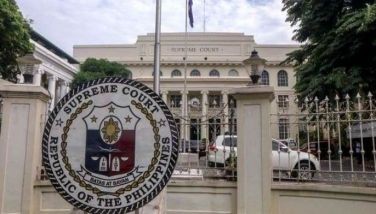12 ailing cop recruits undergo further tests
February 11, 2004 | 12:00am
At least 12 police recruits from the Southern Tagalog are undergoing intensive examination after they were found stricken with infectious diseases, including hepatitis B and syphilis, a police doctor said yesterday.
Superintendent Jerini Zulaybar, health service chief of the Cala-barzon (Cavite-Laguna-Batangas-Rizal-Quezon) police command, said 12 of the 46 recruits initiallly suspected to be suffering from hepatitis B are now confined at the PNP Training Institute in the region.
Zulaybar said all 12 recruits, except for one, were found to be "possibly contagious." Four of them, he said, were positive carriers, meaning their livers have been damaged by the illness.
One recruit was suspected of having syphilis although he tested negative in additional tests.
Zulaybar told The STAR that the 12 ailing recruits were told to take extra precautions although there was no need to isolate them.
The rest of the 46 police recruits were given the go-signal to return to training.
Meanwhile, Senior Superintendent Adolfo Avenido, Philippine National Police health service director, said the hepatitis B cases were discovered when the Philippine National Red Cross (PNRC) conducted a bloodletting at the regional police command two weeks ago.
Chief Superintendent Reynaldo Varilla, Calabarzon police director, said the PNRC initially doubted the blood samples of the 46 recruits, out of 850 who were asked to donate blood.
Varilla said doctors sent the 46 recruits to the University of the Sto. Tomas (UST) Hospital in Manila to determine if they indeed had hepatitis. Results of the blood tests showed that 12 of them were afflicted with hepatitis B.
Zulaybar said a screening panel will have to determine if the 12 recruits can finish their training or will be disqualified.
Superintendent Jerini Zulaybar, health service chief of the Cala-barzon (Cavite-Laguna-Batangas-Rizal-Quezon) police command, said 12 of the 46 recruits initiallly suspected to be suffering from hepatitis B are now confined at the PNP Training Institute in the region.
Zulaybar said all 12 recruits, except for one, were found to be "possibly contagious." Four of them, he said, were positive carriers, meaning their livers have been damaged by the illness.
One recruit was suspected of having syphilis although he tested negative in additional tests.
Zulaybar told The STAR that the 12 ailing recruits were told to take extra precautions although there was no need to isolate them.
The rest of the 46 police recruits were given the go-signal to return to training.
Meanwhile, Senior Superintendent Adolfo Avenido, Philippine National Police health service director, said the hepatitis B cases were discovered when the Philippine National Red Cross (PNRC) conducted a bloodletting at the regional police command two weeks ago.
Chief Superintendent Reynaldo Varilla, Calabarzon police director, said the PNRC initially doubted the blood samples of the 46 recruits, out of 850 who were asked to donate blood.
Varilla said doctors sent the 46 recruits to the University of the Sto. Tomas (UST) Hospital in Manila to determine if they indeed had hepatitis. Results of the blood tests showed that 12 of them were afflicted with hepatitis B.
Zulaybar said a screening panel will have to determine if the 12 recruits can finish their training or will be disqualified.
BrandSpace Articles
<
>
- Latest
- Trending
Trending
Latest
Trending
Latest
Recommended
November 11, 2024 - 12:00am



























